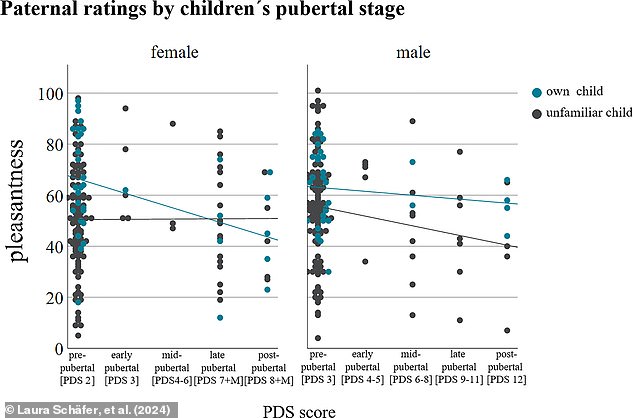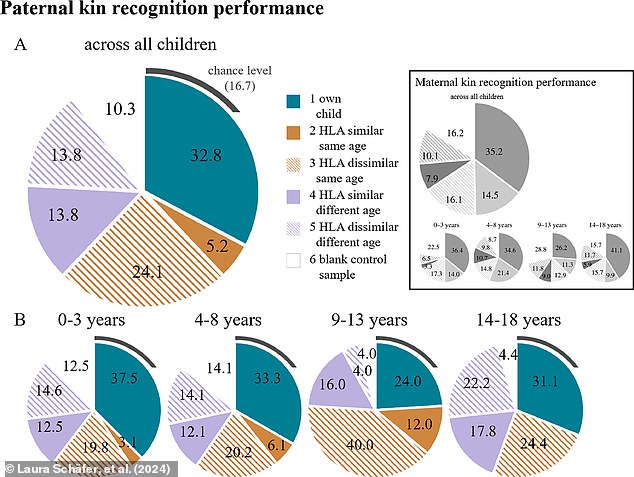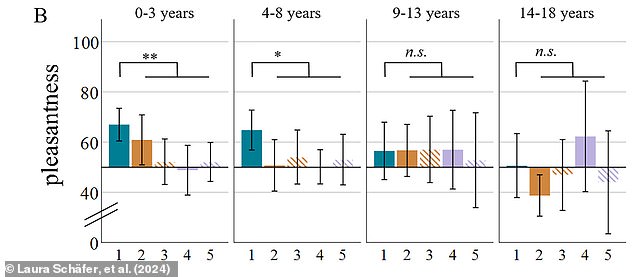Father nose best! Dads can recognise their own children based on their body odour, study finds
From used diapers or dirty laundry: the smells of fatherhood are not always the most pleasant.
But now a bizarre new German study has found that fathers actually prefer the smell of their own children.
Researchers from the Dresden University of Technology found that fathers not only perceived their children to smell better, but could also distinguish their scent from that of other children.
The scientists found that fathers were able to successfully distinguish the smell of clothes worn by their own children in a third of cases.
However, it should come as no surprise that the fathers found their children’s smell significantly less pleasant as they entered puberty.
Researchers have found that fathers not only prefer the smell of their own children, but can also tell them apart based on smell (stock image)
It has long been known that scents play an extremely important role in human relationships.
Chemicals in your sweat that determine your body odor communicate information about your immune system, health and emotions.
Between parents, this scent-based connection is especially important because it helps strengthen a loving relationship.
Studies have shown that our own children’s scent is often perceived as pleasant and activates parts of the brain associated with pleasure and reward.
For this new study, researchers recruited 56 fathers and 73 of their biological children to participate in the study.
The children were asked to shower with an unscented body wash before bed and were given clean, unworn shirts to sleep in that night.

Fathers thought their own child smelled 22 percent better on average, but as these graphs show, that preference declines sharply as their child reaches puberty. This effect is especially pronounced in daughters (left)
In the morning, the parents collected the shirts and sent them back to the researchers who used them to create body odor samples.
Then each of the fathers was asked to rank the scents based on pleasantness, sweetness, intensity, attractiveness and how much they wanted to smell it again.
Finally, the fathers were asked to identify which of the odor samples belonged to their child.
The researchers found that fathers were able to identify their child’s scent more accurately when they were younger — guessing correctly 37 percent of the time for infants and 33 percent of the time for prepubescent children.
That may seem quite low, but it is significantly higher than the 17 percent success rate that would be expected if the fathers were to guess at random.

Fathers could identify their child by smell about 33 percent of the time (blue segments represent correct guesses) at all ages except early puberty
In the article, published in Physiology & Behavior, the researchers write: ‘They are just like mothers [fathers] could recognize their own child’s body odor throughout development, with the exception of early puberty.’
The researchers also measured the similarity of proteins in the immune systems of the father-child pairs, which influence the composition of sweat.
However, they did not find any connection between the similarity of the immune system and the ability of fathers to recognize their children by smell.
Fathers also rated the smell of their own children as significantly more pleasant than the smell of other children.
On average, the children rated their own child as smelling 22.8 percent better than other children.

Scientists believe that the smell of a parent’s own child activates parts of the brain associated with pleasure and reward, promoting a loving relationship (stock image)
The researchers say it is likely that the pleasant feelings associated with their own child’s scent play an important role in how they were able to recognize their offspring.
Additionally, the perceived pleasantness of a baby’s scent has been linked to positive feelings that help promote the bond between parents and children.
The scent of our own children has also been shown to reduce feelings of stress in parents.
But like the ability to distinguish the scent of their offspring, this preference virtually disappeared when the children entered puberty, especially among daughters.
The researchers think this may form an evolutionary ‘barrier’ against incest between fathers and daughters.

The researchers show that fathers’ preference for their own child (blue bar) compared to other children (other colored bars) decreases during puberty (far right graph) as a barrier to incest
The researchers write: ‘The decline was only associated with higher pubertal stages in daughters, supporting the hypothesis of odor-mediated incest prevention in opposite-sex parent-child dyads.’
The researchers note that there is a similar effect between mothers and their sons, supporting the idea that body odor can serve as an incest barrier.
However, they also point out that hormonal changes during puberty may also affect the way parents perceive their children’s scent, so the response may not be related to sexual attraction.
